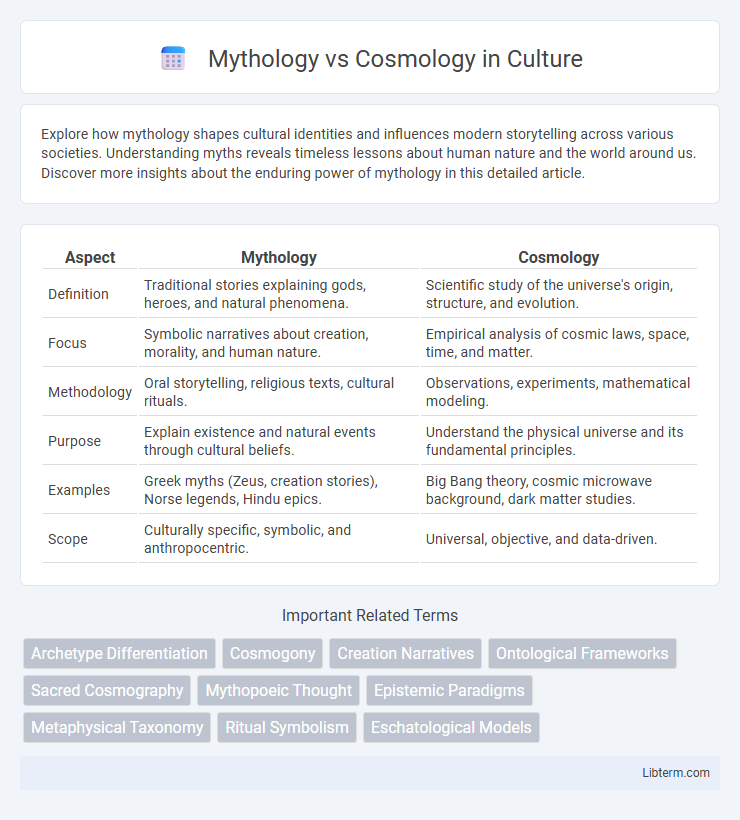Explore how mythology shapes cultural identities and influences modern storytelling across various societies. Understanding myths reveals timeless lessons about human nature and the world around us. Discover more insights about the enduring power of mythology in this detailed article.
Table of Comparison
| Aspect | Mythology | Cosmology |
|---|---|---|
| Definition | Traditional stories explaining gods, heroes, and natural phenomena. | Scientific study of the universe's origin, structure, and evolution. |
| Focus | Symbolic narratives about creation, morality, and human nature. | Empirical analysis of cosmic laws, space, time, and matter. |
| Methodology | Oral storytelling, religious texts, cultural rituals. | Observations, experiments, mathematical modeling. |
| Purpose | Explain existence and natural events through cultural beliefs. | Understand the physical universe and its fundamental principles. |
| Examples | Greek myths (Zeus, creation stories), Norse legends, Hindu epics. | Big Bang theory, cosmic microwave background, dark matter studies. |
| Scope | Culturally specific, symbolic, and anthropocentric. | Universal, objective, and data-driven. |
Defining Mythology and Cosmology
Mythology encompasses a collection of traditional stories, myths, and legends that explain the origins, beliefs, and customs of cultures through symbolic narratives involving gods, heroes, and supernatural events. Cosmology is the scientific and philosophical study of the universe's origin, structure, evolution, and ultimate fate, relying on empirical data and theoretical models from astronomy, physics, and cosmology disciplines. While mythology provides culturally significant explanations rooted in human experience, cosmology seeks objective understanding through observation and mathematical frameworks.
Historical Roots of Mythological Narratives
Mythological narratives have deep historical roots tracing back to ancient civilizations where they served to explain natural phenomena, human origins, and cultural values through symbolic storytelling. These myths often interweave gods, heroes, and supernatural events, reflecting the worldview and religious beliefs of societies such as the Greeks, Egyptians, and Mesopotamians. Cosmology, in contrast, develops from these mythic foundations into systematic and observational frameworks that seek to understand the structure, origin, and laws of the universe through scientific inquiry.
The Evolution of Cosmological Thought
Cosmology has evolved from ancient mythological narratives explaining the universe through gods and supernatural forces to a scientific discipline based on empirical evidence and mathematical models. Early mythologies provided symbolic frameworks for understanding cosmic origins, while modern cosmology employs physics, astronomy, and cosmological principles like the Big Bang theory and cosmic inflation. This shift marks a transition from mythopoetic explanations to empirical inquiry, reflecting humanity's growing understanding of the universe's structure, origins, and evolution.
Mythological Explanations of the Universe
Mythological explanations of the universe often depict cosmic origins through symbolic narratives involving gods, creation myths, and supernatural events, conveying humanity's attempt to understand existence beyond empirical observation. These stories, such as the Greek myth of Chaos giving rise to the primordial elements or the Norse Yggdrasil connecting realms, offer cultural frameworks rather than scientific descriptions. Mythology emphasizes themes of divine order, chaos, and cosmic cycles, contrasting with cosmology's reliance on astrophysical evidence and mathematical models to explain the universe's structure and evolution.
Scientific Foundations of Cosmology
Scientific foundations of cosmology rest on empirical evidence and mathematical models derived from physics, particularly Einstein's theory of general relativity, which describes the gravitational interactions shaping the universe. Observations such as cosmic microwave background radiation, galaxy distribution, and redshift measurements provide quantifiable data supporting the Big Bang theory and cosmic expansion. Unlike mythology, which relies on narrative traditions and symbolic interpretations, cosmology employs rigorous scientific methods to understand the origin, structure, and evolution of the cosmos.
Symbolism and Metaphor in Mythology
Mythology employs symbolism and metaphor extensively to convey complex human experiences and cosmic principles through narratives featuring gods, heroes, and mythical creatures. These symbolic elements serve as allegories for natural phenomena, moral lessons, and existential questions, providing a rich tapestry of meaning beyond literal interpretation. In contrast, cosmology focuses on scientific models and empirical data to explain the universe's origin, structure, and laws without relying on metaphorical storytelling.
Observation and Evidence in Cosmology
Cosmology relies heavily on empirical observation and measurable evidence such as cosmic microwave background radiation, redshift of galaxies, and large-scale structure of the universe to understand its origins and evolution. Instruments like telescopes and satellites provide data that support theoretical models, enabling scientists to test and refine hypotheses about the universe's composition and history. Unlike mythology, which uses narrative and symbolic explanations, cosmology is grounded in reproducible scientific methods and quantitative analysis.
Intersections Between Myth and Cosmology
Mythology and cosmology intersect in their shared pursuit to explain the origins and structure of the universe through symbolic narratives and cultural beliefs. Myths often provide a framework for cosmological concepts by personifying celestial bodies and natural phenomena, embedding scientific observations within allegorical stories. This fusion allows ancient civilizations to integrate spiritual meaning with early astronomical insights, shaping worldviews that inform both religious practices and proto-scientific cosmological models.
Influence on Culture and Society
Mythology shapes cultural identity by conveying symbolic narratives that explain human origins, natural phenomena, and moral values, deeply influencing art, rituals, and social norms. Cosmology, grounded in scientific inquiry, informs worldviews through theories about the universe's origin, structure, and evolution, impacting technological development and philosophical perspectives. Both frameworks drive societal understanding of existence but differ in methodology, with mythology embedding collective beliefs and cosmology advancing empirical knowledge.
Modern Perspectives: Bridging Mythology and Cosmology
Modern perspectives bridge mythology and cosmology by interpreting ancient myths as symbolic narratives reflecting early human attempts to explain the universe. Scientific cosmology provides empirical understanding of cosmic origins, while mythology offers cultural context and anthropological insights into how societies conceptualized existence. Integrating these fields enhances comprehension of humanity's evolving relationship with the cosmos through both mythic meaning and scientific discovery.
Mythology Infographic

 libterm.com
libterm.com